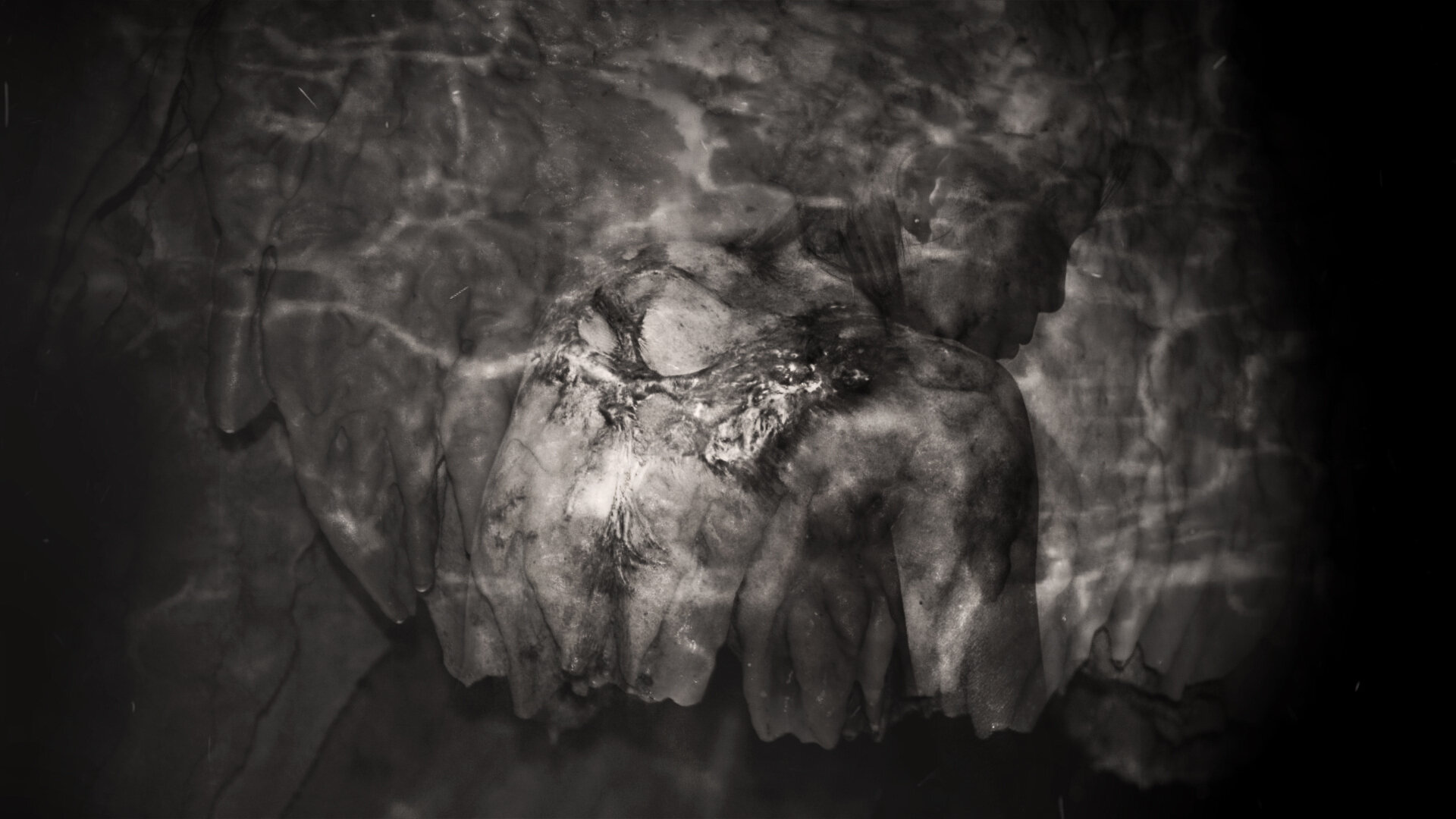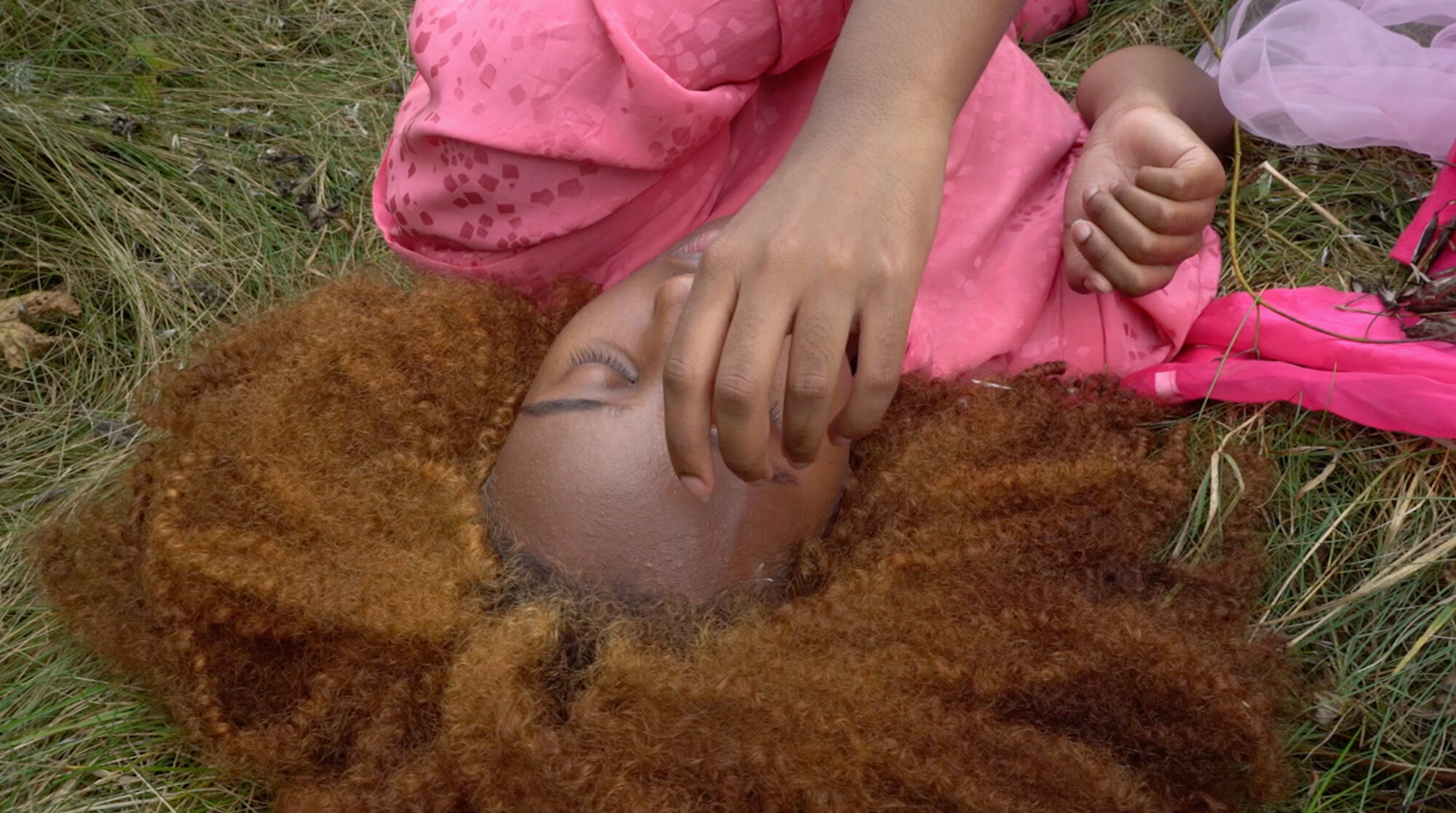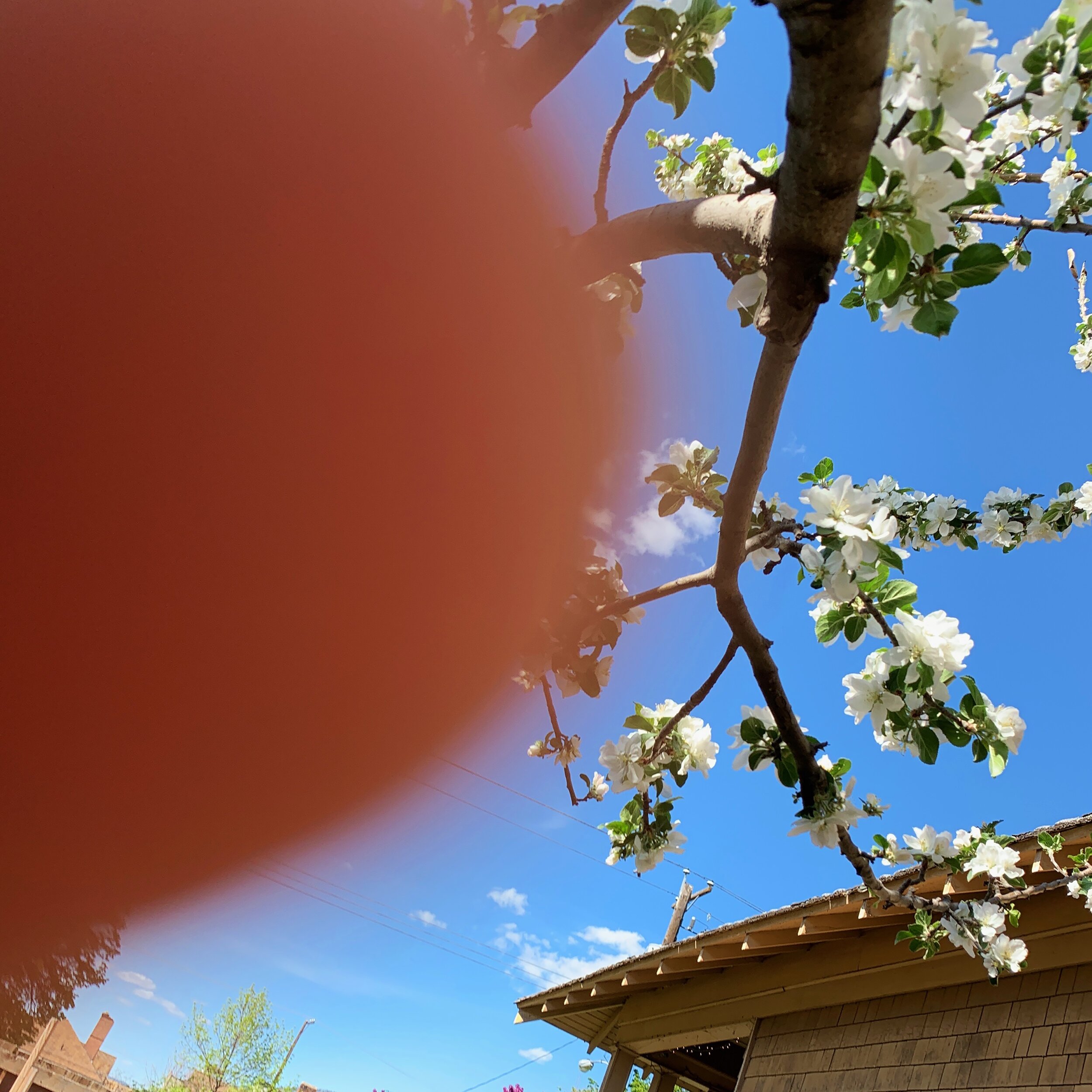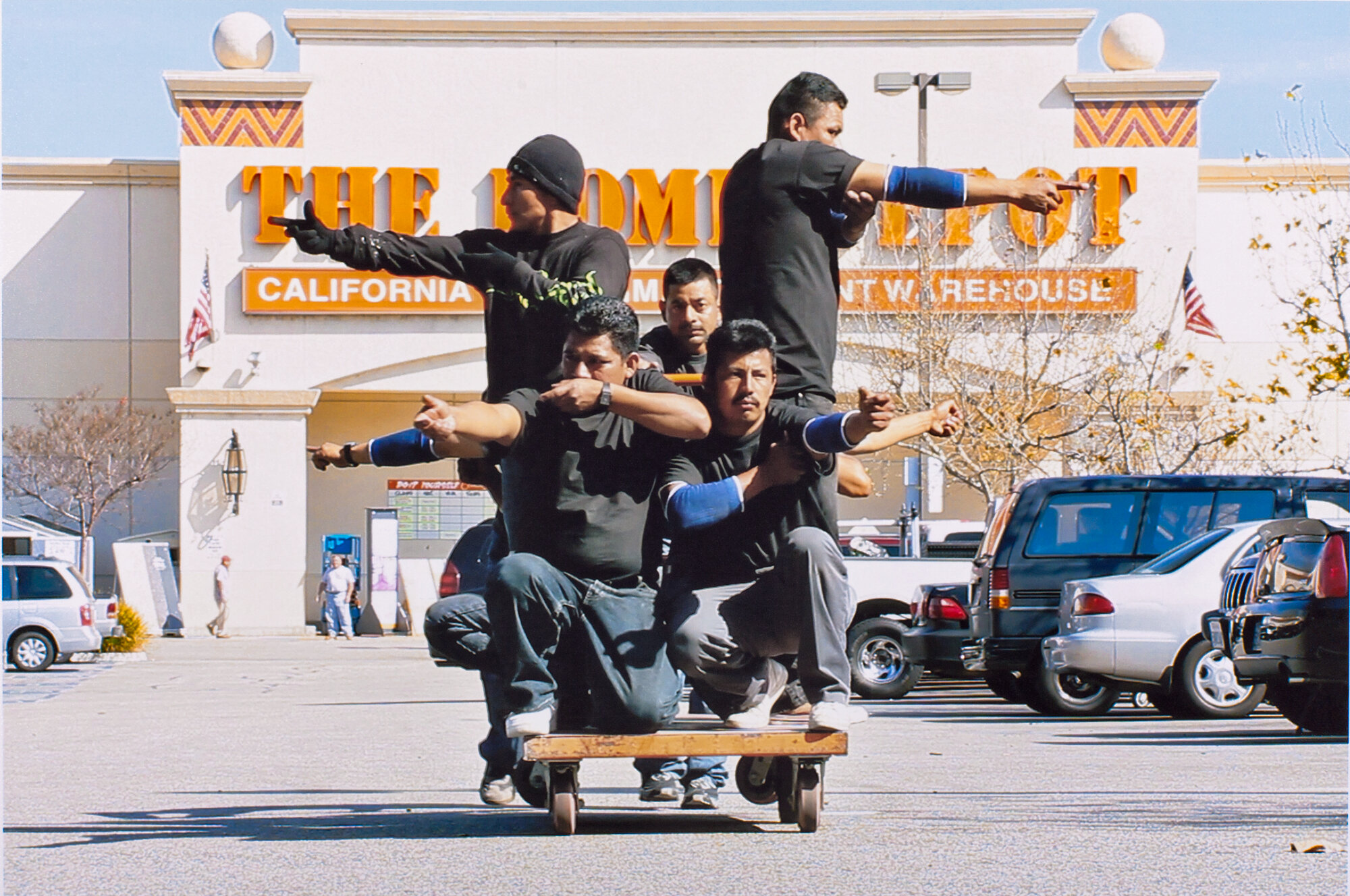
BERTILLE BAK
135 Victoria Street
French artist Bertille Bak is known for her commitment to the collaborative process. She gathered footage for Transports à dos d’hommes while living in a Roma camp on the outskirts of Paris. Bak and members of this Roma community created a playful folktale that hints at the many challenges her subjects face: ongoing demolition of their camps by French authorities, homelessness, the possibility of expulsion from France, poverty and unemployment.

SHIRLEY BRUNO
RIVERSIDE PARK
An Excavation of Us recalls the Haitian Revolution (1791-1804)—the first slave-led insurrection that successfully led to liberation. The film’s narrator is Marie-Jeanne Lamartinière, a legendary freedom fighter, who bravely fought in male disguise against the French during the Revolution. Melding shadow puppetry with footage of the Haitian caves named after this national hero, An Excavation of Us evokes the everyday horrors of slavery where “techniques of torture [were] written down like recipes.” Shirley Bruno uses the caves’ complex cavities as a potent metaphor for the labyrinthian recesses of Haitian collective memory and cruel colonial history. While paying homage to Lamartinière, Bruno reflects on the brutal hypocrisy of French revolutionaries fighting for the democratic values of liberty, equality and fraternity in France while French armies waged war against the slave uprisings in Haiti.

LEVI GLASS
RIVERSIDE PARK
(entry 6pm to 10pm nightly)
Cineorama is an 8-channel, panoramic cinema that merges architecture, cinema and installation to investigate perspective. The interior of the cinema immerses viewers in a full 360-degree series of projections, bringing together virtual reality and multi-linear perspective in an audience-engaged, cinematic setting. The video projected on all eight screens is entitled Baptizo (Latin for “to immerse”). The Cineorama structure itself is a study of the 15th century Baptistery of Saint John in Florence, Italy. It was used by Filippo Brunelleschi to study and formulate his concept of linear perspective, a mathematic system for creating the realistic illusion of three-dimensional depth on a two-dimensional surface. This system had a long-lasting effect on the history of picture making and our understanding of perspective.

ADAD HANNAH
RIVERSIDE PARK
On March 14th of this year, Vancouver–based artist Adad Hannah found himself feeling frustrated and paralyzed by the ensuing pandemic and decided to respond by making artwork to share other’s experiences. The project has now amounted to over 200 collected videos made in his identifiable tableau-vivant style, accompanied by statements from the people in them describing their experience of the pandemic. Hannah's “living pictures” appear like still photographs, but in fact, show the subject attempting to stay still for a few minutes, frozen in time. Using a long camera lens from 5 metres away, Hannah approached strangers in public places from a distance and asked if he could record a video of them standing still from far away. He reflects, “I wanted to see if I could capture this strange and tense in-between moment we are currently in. Things are changing fast yet we're also sort of stuck in time not knowing what comes next.”

SKY HOPINKA
RIVERSIDE PARK
The inclusion of Sky Hopinka’s work Dislocation Blues reflects this exhibition’s exploration of power and resistance and specifically acknowledges the Canadian context of national Wet'suwet'en protests opposing resource extraction on Indigenous land. Dislocation Blues offers a view into the grassroots Dakota Access Pipeline protests. These protests began in early 2016 in reaction to the approved construction of Energy Transfer Partners' Dakota Access Pipeline in the northern United States. The pipeline was projected to run under part of Lake Oahe near the Standing Rock Indian Reservation. Many in the Standing Rock tribe and surrounding communities consider the pipeline to constitute a serious threat to the region's water. The construction is also seen as a direct threat to ancient burial grounds and cultural sites of historic importance.

SANDEEP JOHAL
RIVERSIDE PARK
Sandeep Johal’s animation, For Jyoti speaks to this year’s curatorial focus on themes of power and resistance, strength and fragility. For Jyoti was originally made for the Façade Festival in Vancouver in 2019 where it was projected on the façade of the Vancouver Art Gallery. It tells the story of Jyoti Singh, a young woman whose attack and subsequent death in 2012 united India in heated protests and debate around women’s rights and gender equality. Singh was dubbed Nirbhaya (Fearless) by the media and became the subject of the 2015 film India’s Daughter. Employing her signature graphic style, through her collaborative animation project Johal uses colour and symbolism to represent this tragic event. The work communicates an empowering, uplifting message that honours not only Jyoti Singh but survivors of gendered violence everywhere.

JESSICA KARUHANGA
131 Victoria Street
Incorporating her background in dance and choreography, Karuhanga engages with her body and the bodies of other Black women as a gesture of empowerment and a critique of the Black body as entertainment. Her work offers meditations on the geopolitics of Blackness. In her 2017 video installation being who you are there is no other, Karuhanga subverts common associations with Black bodies and the urban landscape by positioning herself and her collaborator Ahlam Hassan within a pastoral natural landscape. Their brightly coloured hair and clothing and rhythmic flowing movements appear in synch with their surroundings and connected to the landscape. Through the inclusion of Black women within nature, Karuhanga recognizes the absence of the Black female body in representations of the Canadian landscape and creates space for Afro-Diasporic alterity. She asks, "Who gets to experience, witness and revel on the earth here? In what ways can Blackness as urbanity be called into question?"

JESSIE KOBYLANSKI
290 3rd Avenue
Jessie Kobylanski’s new work made for Luminocity 2020, Sustain, is a response to undefinable yet palpable temporal shifts brought on by the global pandemic. The installation incorporates a video taken by her young son, capturing an everyday moment during an unusual time. The video was mistakenly shot on a slow-motion setting, creating both a sense of humour and unintentional majesty. Kobylanski’s installation reflects on how this period of global shutdown has allowed for a new consideration of the mundane, with a focus on the home and a new appreciation for what is in front of you, in the face of fear and uncertainty.

KIRSTEN LEENAARS
RIVERSIDE PARK
Re(Housing) the American Dream is a documentary project by Kirsten Leenaars and a group of young students from Milwaukee, Wisconsin, with whom the artist has collaborated since 2016. Freedom Principles, the third video from this ongoing project, was inspired by the city’s civil rights movement, including the contributions of the youth chapter of the NAACP (National Association for the Advancement of Colored People) during the 1960s. This vibrant video features the youth engaged in a series of collectively performed gestures—skipping, secret handshakes, call-and-response cries, tug-of-war and clapping games. These outdoor vignettes are interspersed with broadcasts from the utopian Radio Freedom, an imagined radio station. Framed by colourful sets built from cardboard, construction paper and masking tape, Leenaars’ young collaborators discuss such pressing political issues as the migrant experience, abortion rights and the necessity of voting.

CAROLINE MONNET
503 Victoria Street
Composed entirely from edited-together clips sourced from Canada’s National Film Board archives, Mobilize celebrates Indigenous knowledge, technologies and labour, highlighting the innovative techniques and virtuosic skills employed in everything from wood carving to steelwork and high-rise building construction. Featuring the impassioned vocals of Inuk throat singer Tanya Tagaq, Mobilize paints a sweeping history of the resilience and brilliance of rural and urban Indigenous peoples, in the face of the crushing and ongoing effects of colonization.

YOSHUA OKÓN
450/460 Victoria Street
Pulpo (Octopus) features a group of Mayan men who fought in the Guatemalan Civil War of the 1990s. The video was shot in a Home Depot parking lot in Los Angeles, California, where these men, now undocumented migrants, would meet to find work as day labourers. Popular re-enactments of the American Civil War are typically played out by hobbyists who recreate historic battle scenes in fetishistic detail; in contrast, Pulpo (Octopus) evokes its subjects’ past experiences and present vulnerability through a silent performance of simple choreographed gestures, far from home, without heroic spectacle.

ISABELLE PAUWELS
RIVERSIDE PARK
The collection of works in Luminocity 2020 presents a portal to complex and often dark histories that inform present contexts. Isabelle Pauwels’ work reveals the challenges of coming to terms with one’s own history. In W.E.S.T.E.R.N, 2010, Pauwels juxtaposes film footage of her parents' home in Richmond with home movies shot in her grandfather's home in the Belgian Congo. Still moments and text act as objects of evidence that simultaneously complicate and provide fragmentary disruption towards an understanding of the videos.

CAMAL PIRBHAI and CAMILLE TURNER
RIVERSIDE PARK
Family Matters, 2017, is an Afrofuturist video and sound installation that follows a mother and son who have escaped 19th century slavery in Canada by time travelling to contemporary Toronto, Ontario.
A collaborative project by Camille Turner and Camal Pirbhai, this work addresses aspects of Canadian history that are not predominantly discussed or taught in schools. In the context of current widespread uprisings against systemic racism this work illuminates important histories that inform the present.

MARINA ROY
465 Victoria Street
In the context of the global pandemic, our bodies and the environment have become dominant sites of conflict and anxiety. Expansive globalized travel and the exploitation of nature for human needs are contributing factors to the widespread nature of the pandemic. Marina Roy’s One Hundred Years Later offers space for considering this present condition and futurities. Using altered ukiyoe prints as backdrops, her animation was made in the wake of the Tohoku earthquake in 2011.

TANIA WILLARD
207 Seymour Street
Tania Willard’s artistic practice and her community-engaged projects cultivated through BUSH Gallery on Secwépemc territory near Chase, BC, are invested in conversations about Indigenous knowledges, traditions, aesthetics, performance and land-use systems. Her work addresses land-based Indigenous contemporary art as a survival strategy for contemporary socio-political upheavals. This series of works made for Luminocity, installed in the window of the Kamloops Museum and Archives, builds on recent projects which address the current moment of transformative energy that has the potential to destabilize colonial institutions and realize de-colonial futures. This installation draws from Willard’s previous work with Secwépemc archival material from the Kamloops Museum and Archives and the American Museum of Natural History. As the title suggests, in response to the complexity of current social, political and economic issues, including community division over the Trans Mountain pipeline, Willard has re-positioned slogans as an archive for a radical future. Tied to intuition, Willard’s imaginings reflect the political present while projecting the potential of a transformed future.
